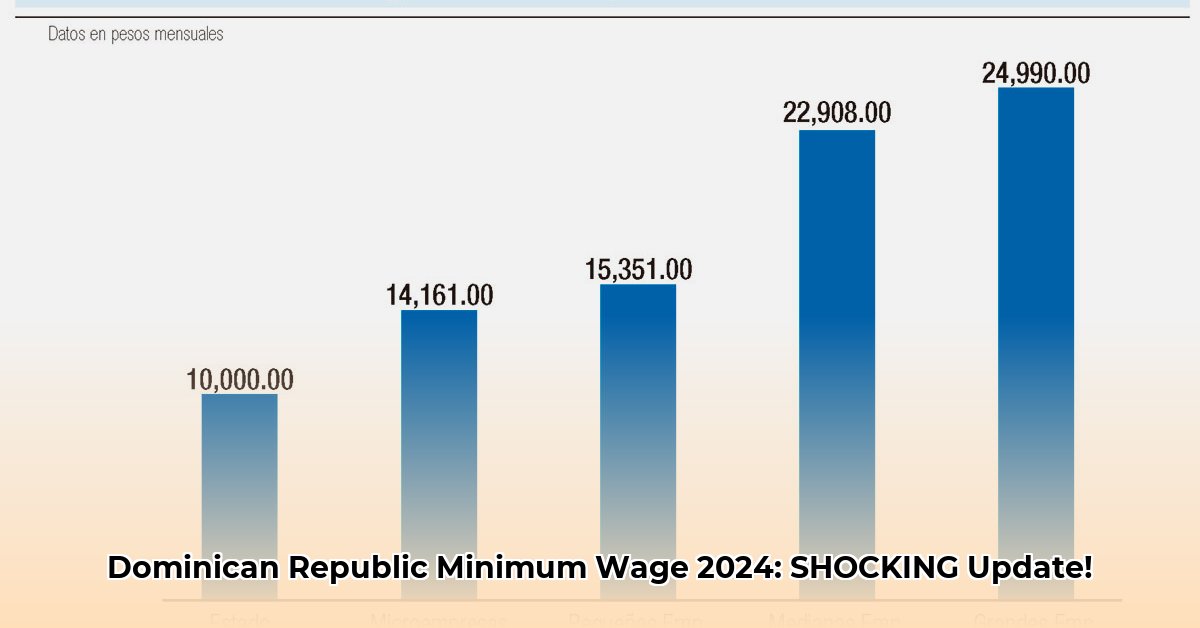
The Dominican Republic's Tiered Minimum Wage System: A 2024 Analysis
The Dominican Republic's minimum wage system, while aiming to balance business needs and worker welfare, presents complexities and challenges. As of February 1st, 2024, the minimum wage isn't a single figure but a tiered system varying significantly depending on company size. This article analyzes this system, highlighting its implications and offering actionable insights for all stakeholders.
Minimum Wage by Company Size: A Detailed Breakdown
The minimum wage is categorized into four tiers based on the employer's size, generally determined by the number of employees and annual revenue. However, precise criteria for classification remain inconsistently enforced and require further clarification. Below are the minimum wages (in Dominican Pesos, RD$) as of February 1st, 2024, based on available data:
| Company Size Category | Minimum Wage (RD$) | Approximate USD Equivalent (as of Oct 26, 2023) |
|---|---|---|
| Micro-enterprises (less than 10 employees) | 14,232 | ~$250 |
| Small Enterprises (10-50 employees) | Data Needed | Data Needed |
| Medium Enterprises (50-250 employees) | Data Needed | Data Needed |
| Large Enterprises (over 250 employees) | 25,116 | ~$400 |
(Note: The USD equivalents are approximate and subject to fluctuation based on the current exchange rate. Consult official sources for precise and up-to-date figures.)
The substantial disparity between the minimum wages for micro-enterprises and large enterprises raises concerns about income inequality and potential socioeconomic disparities across different sectors. A crucial data gap exists regarding the precise minimum wages for small and medium-sized enterprises, hindering a comprehensive analysis of the system's overall impact.
Data Gaps and Inferred Risks: A Call for Transparency
While the nominal minimum wage figures are available, several critical data gaps hinder a complete assessment of the system's effectiveness. The lack of readily available data on enforcement mechanisms, successful compliance rates, and the actual wages earned by workers across different sectors raises significant concerns. The absence of information on sector-specific minimum wages and regional variations further compounds this challenge.
Furthermore, the lack of information leaves a critical data gap in understanding the extent of compliance across various company sizes. Is the tiered system effectively addressing wage disparity or inadvertently contributing to income inequality and exploitative labor practices? Without robust data on enforcement and compliance, it's difficult to gauge the true impact of the minimum wage legislation. This information vacuum presents significant risks, undermining effective policymaking and potentially leading to unfair labor practices.
How can we ensure fair wages for all workers in the DR? What additional data would help provide a clearer picture?
Actionable Intelligence: Recommendations for Stakeholders
Addressing the challenges requires a multi-pronged approach involving concerted action from various stakeholders.
1. For the Government (National Council of Social Security – CNS):
- Enhance Data Collection: Implement a robust system for monitoring compliance and collecting comprehensive data on wages paid across all sectors and regions. This should include regular and unannounced inspections complemented by an accessible online reporting mechanism for employees to confidentially report wage violations.
- Strengthen Enforcement: Increase penalties for non-compliance significantly, accompanied by public awareness campaigns to encourage reporting and transparency. Consider implementing a point-based system to penalize repeat offenders more severely.
- Regular Minimum Wage Adjustments: Institute an automatic annual minimum wage adjustment mechanism linked to inflation and the cost of living index (CLI), ensuring the minimum wage maintains its purchasing power.
2. For Businesses:
- Ensure Compliance: Strictly adhere to minimum wage regulations and maintain transparent wage records for all employees. Proactive compliance demonstrates social responsibility and mitigates legal risks.
- Invest in Employee Training: Enhance employee skills and productivity to offset the increased labor costs associated with a higher minimum wage.
- Promote Fair Labor Practices: Foster a positive work environment that values employees and their contributions.
3. For Workers and Unions:
- Advocate for Rights: Actively engage in collective bargaining and wage negotiations to secure fair wages and improved working conditions.
- Report Violations: Utilize available channels to report instances of minimum wage violations without fear of reprisal.
- Promote Financial Literacy: Equip workers with the resources and knowledge to effectively manage their finances.
4. For Researchers and Analysts:
- Conduct Comprehensive Studies: Investigate the impact of minimum wage policies on different sectors and regions through rigorous quantitative and qualitative research.
- Analyze Regional Variations: Create a cost of living index for different regions, allowing for adjustments of the minimum wage based on location.
- Develop Economic Models: Create predictive models illustrating the effects of different minimum wage adjustment scenarios on the economy and employment levels.
Regional and Sectoral Variations: A Crucial Missing Piece
Further research is essential to explore regional and sectoral variations in the cost of living and their impact on the minimum wage’s effectiveness. Currently, lacking detailed data on these variations prevents a comprehensive understanding of whether the current system adequately addresses the needs of all workers across different regions and industries. A granular analysis focusing on these variations is crucial for future policy adjustments aimed at ensuring fair and equitable compensation throughout the country.
Conclusion: The Need for Transparency and Continued Action
The Dominican Republic’s minimum wage system needs improvements. Transparency in data collection and enforcement, coupled with the development of more nuanced policies that consider regional and sectoral variations, will be crucial for enhancing the system’s effectiveness. The continuous monitoring and evaluation of the minimum wage's impact, informed by rigorous research and analysis, will allow for responsive adjustments, ultimately promoting fair wages and economic stability in the Dominican Republic. The absence of detailed data on small and medium-sized enterprises significantly limits comprehensive analysis, reiterating the need for improved data collection and reporting mechanisms.